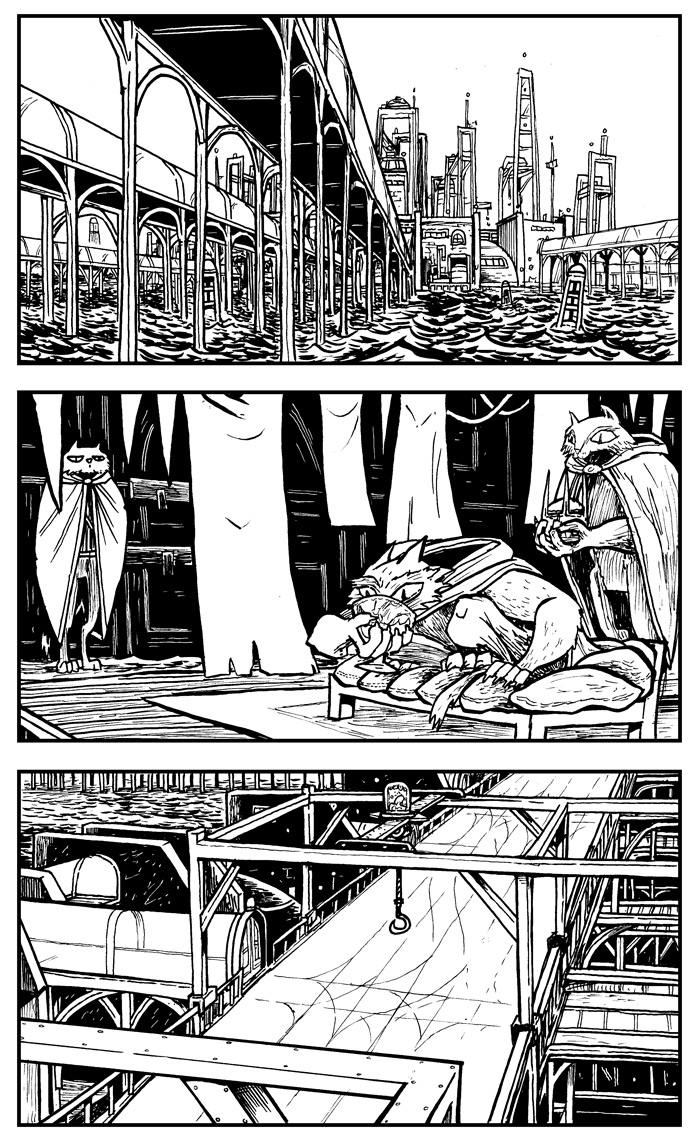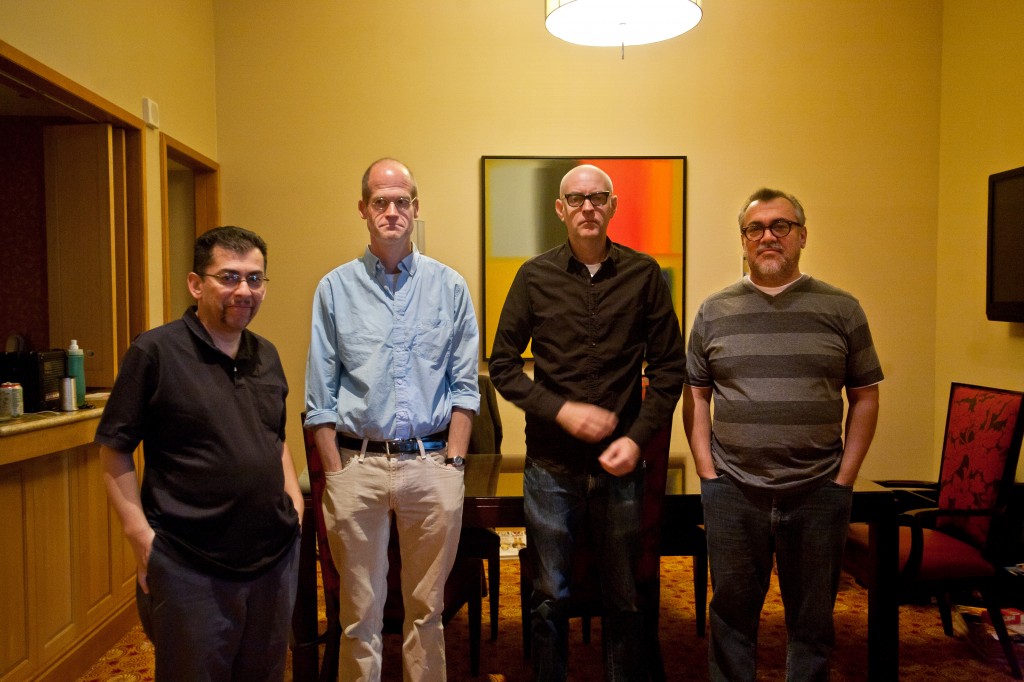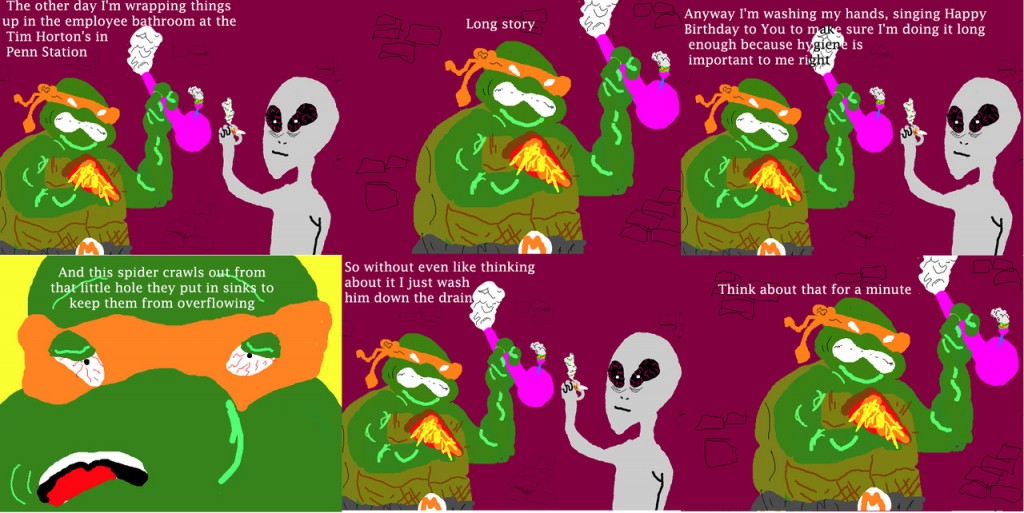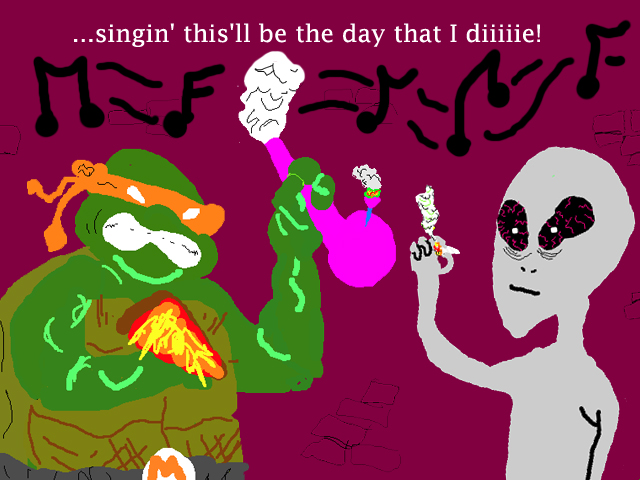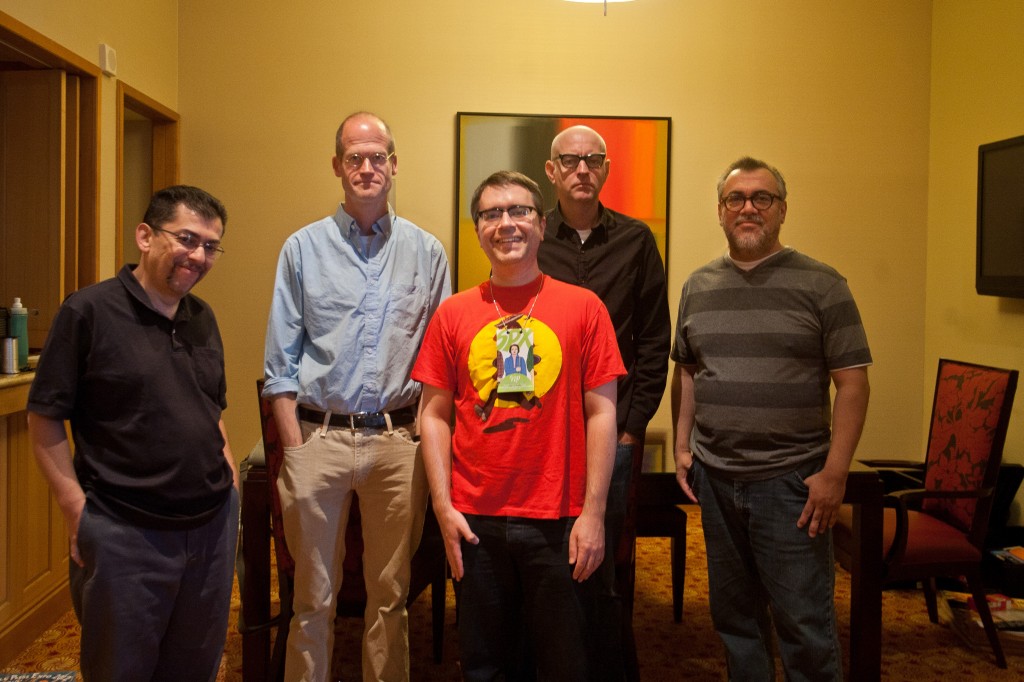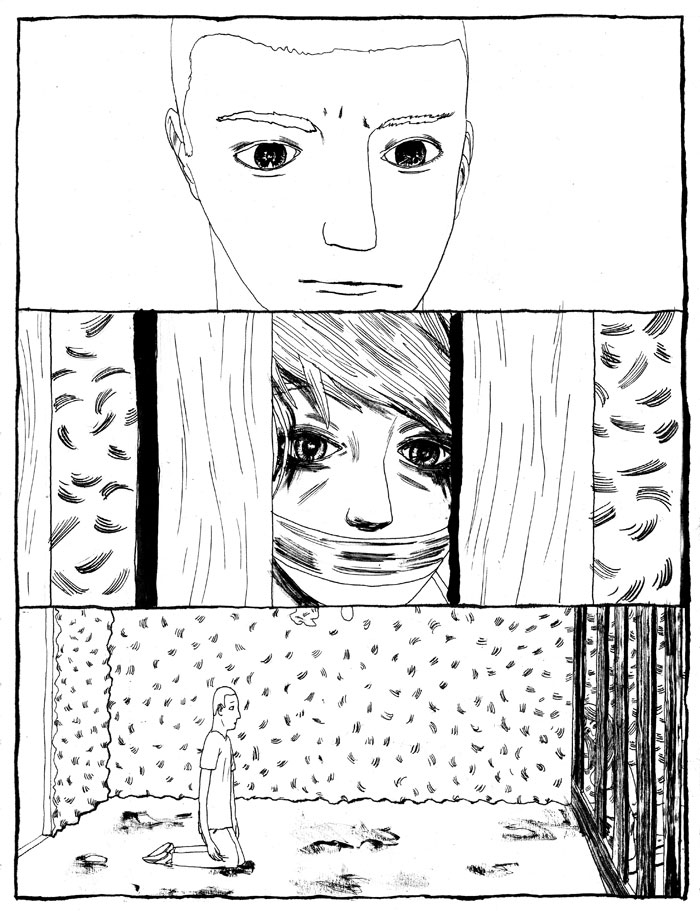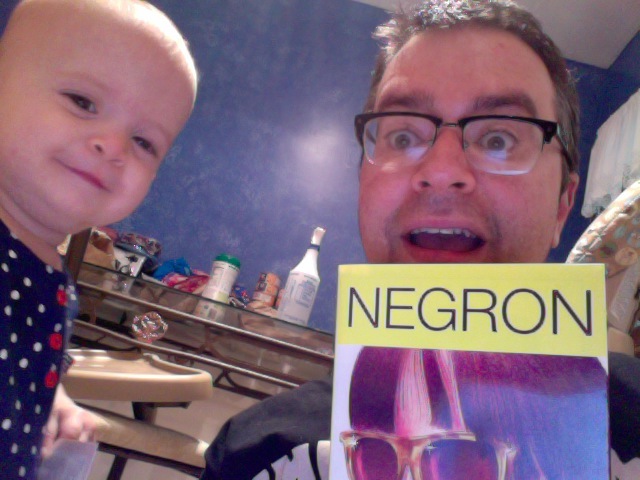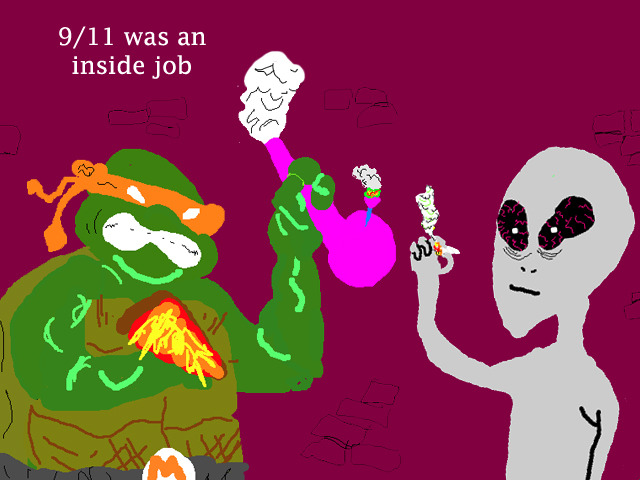Archive for September 30, 2012
“Homeland” thoughts, Season Two, Episode One: “The Smile”
September 30, 2012For my review of tonight’s season premiere of Homeland, please visit Rolling Stone. It’s kind of a half-review, half-vent.
“Homeland” Cheat Sheet
September 28, 2012I’m excited to be covering Homeland for Rolling Stone this season. Here’s a Homeland cheat sheet I whipped up to catch you up in time for Season Two.
Interlude
September 27, 2012Page 18 of “Destructor Meets the Cats” has been posted. Click the link for the full-color version; I just wanted to show off Matt Wiegle’s ridiculous inks.
You can read the whole story so far on one continuously scrolling page by clicking here.
The Four Horsemen
September 26, 2012I interviewed Jaime Hernandez, Chris Ware, Daniel Clowes, and Gilbert Hernandez for Rolling Stone. Comics game Mount Rushmore.
(photo by Meredith Rizzo)
STC vs. TWD vs. RS
September 25, 2012I’m told I have a short article on Michonne, a new character on The Walking Dead, in the current issue of Rolling Stone, with Bob Dylan on the cover. How about that?
“Boardwalk Empire” thoughts, Season Two, Episode Two: “Spaghetti and Coffee”
September 24, 2012* If you asked me “What does Boardwalk Empire do well?” I’d point to this episode, I think. Nothing groundbreaking or earthshaking, just a succession of moments, images, and performances, recorded in an emotionally fraught fashion.
* The opening minutes in particular were marvelous — restrained, dreamlike, unmoored from narrative binding. We go straight from a context-free sequence of hole-drilling and goldfish-dumping to a gaunt Eli Thompson, looking like he stepped out of one of those really severe Renaissance portraits, opening a prison door on the great gray world, and cut from his pas de deux with the great Paul Sparks’ Mickey Doyle (“How are you still alive?”) to a similarly Beckettian exchange between Rosetti, who’s growing on me, and the poor dude who works at the gas station outside his hotel. I loved that non-flow flow, and the absence of background music — no context clues to go by here, you’re on your own. “It occurred to me the basis of fiction is that people have some sort of connection with each other. But they don’t.”
* And this established the template for most of the episode: little one-on-one scenes in which interesting performances bounce off one another. Nucky and his grinning, nubile songbird. Chalky and his buttoned-up future son-in-law, with the reptilian Dunn Purnsley looking on. Margaret and the rude, pipe-smoking doctor. Eli and the genially sociopathic Owen Sleater. Nucky and motherfucking Stephen Root absolutely killing it as a Southern grotesque, transplanted into high-gangster New York as a presence so alien and malevolent and baffling he may has well have been a Great Old One. All these conversations made you feel the futility of conversing in the first place.
* At any stop along the way you could sit back and marvel at the production values, particularly the use of color — the way they captured the gray of the day at the gas station, or the burnt siena walls of the Root character’s empty meeting room, or the joyless white of the recovery room in the hospital when Margaret visits the woman who miscarried.
* Even the violence was effective because it was, at first at least, much lower-key than we’re used to here, and from a different quarter.
* This ep was also a great example of what people talk about when they say Boardwalk Empire sort of misses where its own best stories might lie. How great would a show about Chalky and his family be? Think of how much you could mine from that: city vs. country, wealth vs. self-made men, class and color within the African-American community of the time, the rise of the Prohibition-enabled criminal class and the position of guys like Chalky in that world, the family dynamic, and on and on and on. Or hell, imagine if the season used Eli as its protagonist, and followed his return to this world and his attempt to find a new, much lower place in it. I’d probably prefer that to whatever’s going to go on with Nucky and Margaret at the center, you know? But I’m happy for the tantalizing glimpses, too.
How I Stopped Hating and Learned to Love Billy Joel
September 24, 2012I wrote an essay on growing up on Long Island and my resulting love-hate relationship with Billy Joel for BuzzFeed Music. I kind of can’t believe it either.
“Homeland” is the new “The Wire”
September 24, 2012The very very good tv critic Alyssa Rosenberg celebrates Homeland‘s Emmy rampage last night in light of the show’s real-world, current-events relevance, something the other shows lack. That’s true as far as it gets you, which isn’t very. I’ve been saying for tedious years now that the reason The Wire has come to be regarded as the best show of the New Golden Age over, say, The Sopranos is because everything The Wire has to say, it actually says. On both a thematic and a narrative level, The Wire is about the failure of American government and law enforcement. Since many or even most critics writing for mainstream publications use allegory as the great legitimizer for genre art, this is catnip. You don’t even need to do the high-school English-essay amount of interpretation necessary to figure out whether the zombies represent consumerism or the amphibious monster represents American intervention on the Korean peninsula or whatever — all you need to know is how you feel about the War on Drugs, compare it to how David Simon feels about the War on Drugs, and call it a day. I realize I’m being reductive and unfair, there’s more to The Wire than an editorial cartoon, there’s breathtaking breadth and (the final season aside) depth to what he and Ed Burns did there, but yeah, pretty much that’s what’s going on.
Homeland, to its credit, is a much weirder show than The Wire — things happen that don’t need to happen, that communicate on a level deeper and more inscrutable than the immediate needs of the plot or the politics — and weirdness is where greatness lies. I don’t think greatness lies in condemning our army of flying killer robots or the ubiquitous surveillance state, necessarily. I think bravery lies there, for sure, even just in terms of the personal standing of the cast and crew; think of how many people in the Emmy room last night have done volunteer stuff for the Obama campaign, and then think of well-deserved teeth-grinding contempt in which Homeland holds the Obama drone-strike campaign, for example. But I think we get into trouble if we applaud art for echoing our current-day politics because it lets us off the hook.
To me, as ameliorative and bracing as Homeland‘s critique of Terror War is (it is after all a point of view I fully share, urgently share even, given my Damascene conversion years back), it comes much more alive when connecting the workaday lies we tell our loved ones every day, the secrets we keep from them, and the lies and secrets that end up getting people killed. It’s about cultivating deception as a habit of thought, and the short distance between cutting people out of your personal reality and a willingness to create a reality without them in it at all. Watching Carrie and Brody conduct their self-destructive secret lives while putting up a front to those who care for them is the meat of the show, for me, not the op-ed stuff.
So that’s why I’m not happy that Homeland beat Mad Men or Breaking Bad, or maybe even Game of Thrones — on an apples-to-apples basis those shows have more meat (to mix my food metaphors) even if no scenes take place in CIA headquarters. They also didn’t take a nosedive in the final third of the season and reveal an inherent structural limitation that would’ve left them better off as miniseries than as ongoing serials, and making the Vice President an asshole can’t get you past that either.
“Homeland” thoughts index
September 21, 2012Below are links to all my posts on Homeland, to be updated as the series progresses. I hope you enjoy them.
* Season One, Episode One
* Season One, Episodes 2-5
* Season One, Episodes 6-9
* Season One, Episodes 10-12
* Homeland is the new The Wire: thoughts on allegory and topicality in fiction
* Homeland Season Two Cheat Sheet
* Season Two, Episode One: “The Smile”
* Season Two, Episode Two: “Beirut Is Back”
* Season Two, Episode Three: “State of Independence”
* Season Two, Episode Four: “New Car Smell”
* Season Two, Episode Five: “Q&A”
* Season Two, Episode Six: “A Gettysburg Address”
* Season Two, Episode Seven: “The Clearing”
* Season Two, Episode Eight: “I’ll Fly Away”
* Season Two, Episode Nine: “Two Hats”
* Season Two, Episode Ten: “Broken Hearts”
* Season Two, Episode Eleven: “The Motherfucker in the Turban” / “In Memoriam”
* Season Two, Episode Twelve: “The Choice”
* The 12 Best Moments from Homeland‘s Bad Season 2
* Season Three, Episode One: “Tin Man Is Down”
* Season Three, Episode Two: “Uh… Oo… Aw…”
* Season Three, Episode Three: “Tower of David”
* Seven Ways to Save Homeland
* Season Three, Episode Four: “Game On”
* Season Three, Episode Five: “The Yoga Play”
* Season Three, Episode Six: “Still Positive”
* Season Three, Episode Seven: “Gerontion”
* Season Three, Episode Eight: “a red wheelbarrow”
* Season Three, Episode Nine: “One Last Time”
* Season Three, Episode Ten: “Good Night”
* Season Three, Episode Eleven: “Big Man in Tehran”
* Season Three, Episode Twelve: “The Star”
“Homeland” thoughts: the last three episodes of Season One
September 21, 2012SPOILER ALERT
* You might have noticed I didn’t put the episode titles in the header for this post, as has become my custom. That’s because the title of Ep 10 is “Representative Brody” — yup, that’s a spoiler right there in the name of the episode. (The others were called “The Vest” and “Marine One,” just for the record.) I found myself struggling with this kind of shit throughout this final run, and often due to people who should know better, like the people who named the episodes, or the network, which thought it would be a good idea to put a spoiler-filled ad for the Homeland Season One DVD/Blu-Ray box set as the first thing you see when you fire up an episode of the show on Showtime On Demand. I fucking saw his hand on the bomb detonator before I watched the, like, third episode! And of course I knew he ultimately lived to co-star in Season Two. And thanks to smart alecks who think it’s a good idea to drop lines like “In Homeland‘s literally shocking season finale” amid articles that aren’t in-depth discussions of Homeland that I’d therefore know to stay away from, I had a pretty clear idea of where Carrie was headed, too. Irritating. I know that many pro TV critics have developed callouses where their sensitivity to spoilers ought to be, but for those of us who aren’t inundated with screeners for every show, who don’t watch every show, it’s hella annoying — more so, Showtime, when it’s you doing it!
* Anyway, perhaps you can tell from my tone, but I found this final stretch of show deeply frustrating. Not just due to the spoilers, mind you — I am capable of getting past that kind of thing, thank you very much, as anyone who’s ever heard me talk about Twin Peaks, A Game of Thrones, or the first three or four seasons of The Sopranos can tell you. Ultimately it’s the execution that keeps you coming back (though contra my “who cares about spoilers” critical brethren, I firmly believe that what a show chooses to withhold, and when it chooses to reveal it, and the experience of encountering that reveal in that moment, is a part of the execution, not a stunt), and, you know, Homeland remained a well-acted and tense and thoughtful show. But it was a well-acted and tense and thoughtful show that was hamstrung by it structure in several ways.
* First, in order to keep the focus on Brody and Nasir’s unknown endgame, it had to downplay the severity of everything else. America’s first-ever modern-day suicide bomber blows up a plaza in downtown DC, killing a Saudi diplomat among four other people, injuring dozens including several spooks, in the middle of an operation that brought said diplomat to that location with the knowledge of 16 government agencies on the intelligence side alone, and the very next day a smiling Sgt. Brody announces his candidacy to the fawning press? I didn’t buy it any more than I bought that the entire country wouldn’t have flipped the fuck out. Same with the sniper attack, which wasn’t even an hour old before the Vice President, who was covered in the blood of one of his oldest friends and biggest supporters, was crackin’ wise and characterizing the day’s events with “What a fuckin’ day.” That it was, sir! Finally, no one seemed to give another thought to the fact, the fact, that the world’s most wanted terrorist has a mole inside the homeland security apparatus. It all rang false emotionally as well as politically.
* Second and more fundamental is the issue of anticlimax. Everything builds to a bomb that doesn’t go off, carried by a criminal that doesn’t get caught. That level of narrative blueballs is going to be very difficult, if not impossible, to endure over the course of multiple seasons — it was hard enough to watch the half hour or so left of the finale as it was. You start to wonder if this isn’t one of those shows whose concept can’t really sustain year after year of material.
* That’s to say nothing of the fact that given what we know about the Vice President and his cronies, if this were a slightly less civilized show like Deadwood or Game of Thrones, we’d be cheering for whoever blew him up.
* Speaking of which, more or less: I’m glad Carrie noticed that a surgical sniper attack on the President or Vice President isn’t the usual terrorist style; as I said before, it’s practically honorable, having a highly trained soldier kill one military leader instead of inducing some teenager to blow up a marketplace or whatever. But also as I’ve said before, Abu Nasir displays an almost supervillainous ability to further his master plan. He turns not one but two highly trained Marine snipers? Partners, no less? He sustains them with a multi-person network located within the United States, consisting of diplomats, moneymen, hitmen, willing American accomplices, bombmakers, goons, and on and on and on? If he can get all those people into place you start to wonder why he hasn’t already acted. Even if all he wanted was vengeance, at this point he probably could have had it and then some.
* And that Twilight Zone ending! The moment Saul mentioned the death of Nazir’s son to Carrie, I literally stopped and wrote down exactly what was going to happen: “The son’s name is Isa, and she’ll remember Brody shouting it in his sleep, and then zzzap.” When the nurse told the sister “It’s the anesthetic, everyone does it” I made a wah-wah-wah sad trombone noise, it was so corny.
* I mean, nothing but love for Claire Danes’s performance of Carrie’s mania. This was a side of that character that had to stay pretty much hidden for the entire season, and then suddenly Danes had to dig down and fish this whole new personality out at the drop of a hat. She was riveting, and the sequence in which Saul works with her color coding and produces the clue that could crack the case because that’s how much he loves and respects her even when she’s crazy was breathtaking. Patinkin was strong throughout these final episodes too, with his quiet anger at Estes and his palpable discomfort with discovering how helpless and in need Carrie really is. It was smart of the show to save the Carrie-Dana get-together for the climax, since it’s always fun to force two characters who’ve never interacted together at a big moment. The time-lapse image of Brody just standing there looking at Little Round Top in Gettysburg was good and creepy. There was a beautiful shot of Walker in the apartment he broke into, setting up his sniper rifle against the nighttime skyline of DC while the woman looked on, tied to the chair. “There’s no time, Saul…It’s high purple…” is a great line, Carrie’s “I am the one who knocks” or “It will shock you how much it didn’t happen.” I did a lot of fun guessing as to the identity of the mole. It’s great that the real villain is “drone strikes.” But ultimately I felt like they slapped a “to be continued” where god and science demanded a “the end.”
Stoner Alien: Life Is Suffering
September 21, 2012Heavy shit in today’s installment. It’s a supersized one, too.
James Franco Sings
September 21, 2012James Franco started a band with an art-school classmate (and Smokey Robinson) and I talked to them (not Smokey) about it for Rolling Stone. If you were wondering, he was extremely nice and soft-spoken and appears to do all the different things he does not out of ego but simply because he really enjoys working.
Stoner Alien: Musical Episode
September 19, 2012How I spent my Saturday morning
September 18, 2012“Homeland” thoughts, Season One, Episodes 6-9: “The Good Soldier,” “The Weekend,” “Achilles Heel,” “Crossfire”
September 18, 2012* I guess you know you’ve hit a good stretch of episodes of a TV show when, depending on the point at which you stop writing and start writing, the show you’re writing about could be about something entirely different.
* Anyway, before we get into it, a few stray observations from earlier in the season:
* I’m not sold on the opening credits, partially because I think formless jazz squawking as your theme music is a dropped ball when I could hum you the theme songs of all the other great dramas on TV right now, and partially because I think it implies a ubiquity of Terrorism as a society-shaping force that didn’t exist prior to 9/11. I’m a year older than Claire Danes and when I think back to childhood memories of terrorism and terrorists, they weren’t frightening at all, they were the bad guys in Back to the Future and The Naked Gun.
* I realized I wasn’t as ready as Carrie was to make the leap from suspecting Prince Fareed of direct involvement with Abu Nasir’s terrorist group to suspecting someone else in his entourage because while she bases this decision on how convincingly upset he seemed by the murder of his escort-girlfriend, we in the audience are at this point used to people lying convincingly on any number of levels, not the least of which is the fact that we’re watching actors pretend to be characters who are pretending to be things that they’re not. I don’t know why you’d buy Fareed’s grief on those grounds. (It didn’t help that it wasn’t a particularly convincing performance of grief on a meta level.)
* Brody don’t flail. This isn’t Walter White, careening from calamity to calamity; it isn’t even Don Draper, whose surface cool often feels about an inch deep when he’s provoked. Brody isn’t desperate. He isn’t stumbling and scrambling in terms of his secret mission — he’s gliding, with only garden-variety PTSD and jealousy tripping him up.
* Okay, now on to the events at hand:
* The Rachel Corrie/John Walker Lindh mashup terrorist woman is in a relationship with the other guy — she’s not just his minder! This show’s choice to humanize the enemy at every turn, the same way that our own warriors go home and kiss their wives and hug their kids and mean it, is admirable, but it also makes for some unexpected plot twists.
* “Tell that to the guys in Guantanamo.” They can’t turn themselves in because they know they could easily be tossed into a hole for life with no legal recourse. Fucking Gitmo.
* Aileen is basically Dark Carrie: A pretty-in-a-patrician-way intense motivated blonde making up for the sins of her father.
* Smart writing to have her repeatedly refer to her boyfriend as a “brown boy,” meant to indicate her father’s bigotry but also tipping us off to her own fetishization of that status.
* I think it’s funny that Mexico has its own lighting scheme that repeats across shows — blown out and brown. Is this legally mandated?
* SAUL IS THE FUCKING MOLE?!?! Okay, probably not, but I sure jumped when I saw the polygraph needle go haywire when he was asked about the razor. Clever, clever work on the show’s part, to introduce an entirely new element of uncertainty at the exact moment it appears to be exonerating Brody, and thus challenging us to wonder whether we’ve been watching a different show all along. They got pretty playful about this, actually, the best example being having him shadily insist on personally escorting Aileen back from Mexico, and then revealing that he truly was just the best person to crack her open.
* Saul had great material throughout this stretch. His sad attempts to be happy and enticing in the face of his wife’s determination not to be his wife anymore made me whistle with impressed empathy a few times. My favorite: When Mira describes them as “good friends sharing a house,” listing the separate activities they indulge in, and he responds with a rueful, honest “Sounds perfect.”
* Carrie and Brody: hooooooo boy. Pretty hot sex scenes, though, I’ll be honest with you, particularly that first one in the car in the parking lot. Carrie’s look of “HOLY SHIT” the whole time is a look you like to see! Maybe not for those exact reasons, but yeah, basically on target. And her kissing his scars? Suspecting what she suspects about their end result, yet still being so into him as a person and him as a physical body capable of receiving and delivering pleasure that she attempts to pleasure him through them? If you believe as I do that the key to a genuinely sexy sex scene on TV is people acting on a clear, mutual desire to give and take pleasure from each other, that’s tough to fuckin’ top.
* It was also a terrible idea. Which almost goes without saying, but you think maybe there’s a plan. There’s no plan.
The question was, does HE have a plan? It doesn’t seem like it there, either.
* Very nice drunken camerawork as night falls at the cabin. Shifting around unpredictably. Never seen it done quite that way before.
* How much of Brody’s explanation that his big secret is simply that he’s a Muslim convert who’s ashamed of his Stockholm syndrome was actually convincing to me — because it WAS — and how much of it was simply that I wanted to be convinced? — because I DID!
* Something that struck me in the scene where daughter Dana tells “Uncle” Mike what’s what reminded me of how I reacted to the surveillance-footage scenes earlier in the season: When you see people in these everyday domestic environments, during which they’re meant to be totally at ease and not performing for anyone but each other, and their conversations are studded with meaningful pauses–I don’t have meaningful pauses. I endeavor to fill all gaps in conversation with a response. When I don’t it’s because I’m truly at a loss for words, not because i’m thinking real hard. Just a tic of the writing that doesn’t ring true to me is all, brought to the fore by that surveillance-camera format.
* I’m not sure what’s less plausible in a lightning-strikes-twice sense: That Marine sniper partners both get turned by al-Qaeda, or that they both did so well in the wife department.
* In all seriousness, the introduction of Walker strains credulity as much as anything since the “whoops, no camera in the one room wher he’s unequivocally doing something suspicious” gambit. Instead of getting him declared dead and sneaking him back into the country to shoo the president with a sniper rifle, why not just return him home through escape or re-capture and have him kill the President on TV when they inevitably meet-and-greet? Given the tremendous size and exposure risk of Walker and Brody’s support network — diplomats, major domos, royalty, hitmen, roving crowbar-wielding thugs, people with machine guns conducting hits in midwestern hotels, etc. — you’d think they’d want to trim as much of the fat as possible.
* Uhhh…As far as terrorist plots go, assassinating the president with sniper fire is kind of the honorable way to go about it, isn’t it?
* “After eight years, what’s two more days?”
“What’s that supposed to mean, you don’t even care? Because I do.” Great response to that kind of sarcasm from his wife by Brody. Weathering the demands of trauma on this scale has to be a constant process for both of them, his secret agenda notwithstanding, and I bet you the temptation to just shut it down and do the bare minimum effort is as powerful as the ability to shut that down with a well-selected response is rare.
* The Veep political consultant lady’s ludicrous accent disappeared, thank Christ.
* Disgraced congressman “Dick Johnson” – LOL, good one Homeland
* Man did I want Brody NOT to be a terrorist.
* “You’re really fucking something, Carrie, I gotta hand it to you.” I laughed out loud at that line from David Estes, both because of the blunt, disbelieving delivery and because it’s funny to think of the kind of pass you have to arrive at with a coworker to come right out and say shit like that.
* “If there’s another terrorist attack, this country is primed to turn on itself. You and i both know we’re halfway there already.” Indeed we do, Carrie.
* The Isa stuff made me very very sad. Like, it was the trigger mechanism for a sobbing, bawling breakdown I had a couple hours later. That bad. I don’t even care if they stacked the deck by having his last act as a living little boy be singing “Take Me Out to the Ballgame.” We’re killing children with flying killer robots. You can’t be manipulative with facts like that. They are what they are, and you show what you show.
* Okay, so maybe “And they call us terrorists” was a little much, though. And I say that as a fan of “And they call us savages” from Mad Men!
* “Make no mistake.” Ha, what a hateful Bushian phrase to hear in the Veep’s speech following the attack that killed Isa. Also, in what world does the VP give those addresses?
* LOL at Saul and Carrie coming within seconds of seeing Brody at the diplomat’s house. I dunno, Homeland. That kind of credulity-stretching anticoincidence one place where they really shouldn’t stack the deck.
“Boardwalk Empire” thoughts index
September 18, 2012Below are links to all my posts on Boardwalk Empire, to be updated as the series progresses. I hope you enjoy them.
* Season One
* Season Two, Episode One: “21”
* Season Two, Episodes 2-5
* Season Two, Episode 11: “Under God’s Power She Flourishes”
* Season Two, Episode 12: “To the Lost”
* Season Three, Episode One: “Resolution”
* Season Three, Episode Two: “Spaghetti and Coffee”
* Season Three, Episode Three: “Bone for Tuna”
* Season Three, Episode Four: “Blue Bell Boy”
* Season Three, Episode Five: “You’d Be Surprised”
* Season Three, Episode Six: “Ging Gang Goolie”
* Season Three, Episode Seven: “Sunday Best”
* Season Three, Episode Eight: “The Pony”
* Season Three, Episode Nine: “The Milkmaid’s Lot”
* Season Three, Episode Ten: “A Man, a Plan…”
* Season Three, Episode Eleven: “Two Imposters”
* Season Three, Episode Twelve: “Margate Sands”
* Season Four, Episode One: “New York Sour”
* Season Four, Episode Two: “Resignation”
* Season Four, Episode Three: “Acres of Diamonds”
* Season Four, Episode Four: “All In”
* Season Four, Episode Five: “Erlkönig”
* Season Four, Episode Six: “The North Star”
* Season Four, Episode Seven: “William Wilson”
* Season Four, Episode Eight: “The Old Ship of Zion”
* Season Four, Episode Nine: “Marriage and Hunting”
* Season Four, Episode Ten: “White Horse Pike”
* Season Four, Episode Eleven: “Havre de Grace”
* Season Four, Episode Twelve: “Farewell Daddy Blues”
“Boardwalk Empire” thoughts, Season Three, Episode One: “Resolution”
September 17, 2012* As I sat down to write this I thought it would be worthwhile to do a quick re-read of the reviews I wrote last season. There weren’t many; this isn’t a show I felt compelled to examine week after week, even though I invariably enjoyed myself. That changed with the final two episodes, which were haunting, nihilistic, exceedingly well-made even by Boardwalk Empire‘s big-budget standards, and deeply, batshit weird. The penultimate episode in particular developed its own syntax of dialogue and editing the way a great film does, while the finale was the equivalent of chopping your arm off, fully expecting a new arm with superpowers and three-foot claws to grow in its place. The skill, audacity, and brutality had my expectations high for this season premiere.
* Imagine my disappointment when we open with Terence Winter’s fanfic version of the coin toss scene in No Country for Old Men: “If I wrote it, he’d’a BEAT the guy to death with those sunflower seeds!” It turns out that if you rupture the tension by allowing it to vent through violence, you turn the scene into sort of a turd! The rote retread of another, better scene, coupled with the depressing addition of a cute little dog barking in anger and confusion as someone kills her daddy, was a “Man, have I been wasting my time with this shit all along?” moment — a moment many other critics have had, by the look of their tweets and headlines last week. (It didn’t help that we got another warmed-over, dumbed-down cover version of a famous scene from a crime-cinema landmark later on, when Agent Van Alden served as Enzo the baker to the Irish gangster-florist’s Michael Corleone as he bluffed Al Capone out of attacking.) If, as it seems from his position in the credits and the promotional materials, Bobby Canavale’s dyspeptic Chip Rosetti is going to be this year’s Jimmy, I felt like we could be in for a long season indeed.
* But as I went through those reviews I was struck by this passage, which I remembered in terms of the general sentiment since it’s something I think and talk about often regarding genre art but which I’d completely forgotten writing in the context of this show:
I think that when genre material gets sufficiently dark or weird, when its tropes become a form of sinister spectacle rather than just hitting the marks required by convention, that’s a depth all its own — a way to communicate the emotional and philosophical themes more commonly articulated by plot and dialogue, if at all. Boardwalk Empire the balls-to-the-wall engine of gorgeously shot death that perverts and slaughters its characters in periodic fits of nihilism is saying at least as much as some theoretical Boardwalk Empire the meticulously drawn character study, or Boardwalk Empire the rigorously developed allegory for contemporary political issues.
“Balls-to-the-wall engine of gorgeously shot death that perverts and slaughters its characters in periodic fits of nihilism” is as good a way as any to describe Boardwalk Empire when it works. The “periodic fits” thing is key, because this is a far less rigorous show than any of the truly great TV dramas. Its bursts of brilliance are just that, bubbling up from a cauldron of gorgeous clothing and thoughtful lighting and sumptuous sets and giallo violence and a suite of the strangest gangster performances of the post-Godfather era.
* This means you have to put up with some imbalances as the contents shift during takeoff: building up Manny Horvitz as a macher (up to and including a giving him a hand in Jimmy’s death) only to ice him in the season premiere; inexplicably delaying Richard Harrow’s vengeance against the guy for a year and a half even though Richard as we know him would have murdered literally everyone involved in Jimmy and Angela’s deaths before the following weekend; weathering whatever dull do-gooding conscience salve they’re making Margaret apply to herself this season (temperance! Catholicism! prenatal care!); airing a premiere with no Eli or Chalky or Junior Soprano Van Buren; etc.
* But it also means this show has an easier time stumbling into weird little treasures, like Jack Huston’s Richard Harrow or Erik LaRay Harvey’s Dunn Purnsley or Paul Sparks’s Mickey Doyle, that normal shows have to strive for, if they ever even get close. (Paz De La Huerta was just a little too close to the sun.) That’s what you watch for.
* Anyway, the only thing I can really think of to say that doesn’t pertain directly to that Grand Unified Theory of Boardwalk Empire for Better and for Worse is that I’m glad Nucky and Margaret are going full Lockhorns. Nucky’s cool-customer asshole persona, the one that coldly orders a man’s execution while walking out of a room, doesn’t do much for me; we’ve seen that a million times, and it’s Steve Buscemi’s least convincing look. (Although you can make the argument that that’s as it should be, since it’s probably Nucky’s least convincing look, too.) Angry asshole Nucky, on the other hand, is really something — vibrant and frightening and unpredictable. His contretemps with Margaret have historically been where that side comes out most reliably, and I’ll be glad to see it more often, especially in contrast with his new iceman approach to gangstering.
* Oh yeah, one other thing: Nice fakeout, making it look like Van Alden was going undercover to investigate a bathtub gin maker as a kind of vigilante, but then revealing that nope, he really is a door-to-door salesman now.
* Anyway welcome back Boardwalk Empire, the most decadent show on television.
Cage Variations, part two
September 17, 2012Part two of Cage Variations, a graphic novel I wrote and Matt Rota drew, is now up at Study Group Comics.
You can read part one here. I hope you enjoy it.
STC at SPX
September 14, 2012I’ll be attending SPX this weekend! Mostly Saturday. I’m hosting the Gilbert Hernandez panel at 2:30pm in the White Oak Room, and my illustrious colleague Colleen Frakes will be selling our comic Here at the End of All Things at table J3, pretty much right when you walk in the door. Please say hello to me! I look like this:


